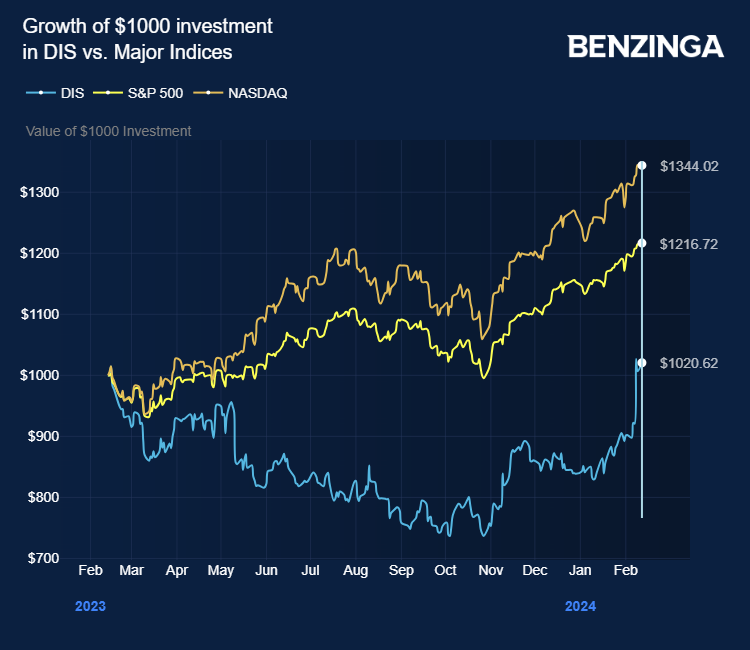Zinger Key Points
- Hedge funds take boardroom fight to Disney shareholders on April 3.
- Proxy battle expected to cost all parties millions of dollars.
- Find out which stock just claimed the top spot in the new Benzinga Rankings. Updated daily— discover the market’s highest-rated stocks now.
On April 3, Walt Disney Company DIS shareholders will vote for their board selections in the culmination of one of the most bitter, expensive shareholder fights in history.
Slugging it out against the media giant are two activist hedge funds who are making separate bids to have their representatives win seats on the Disney board.
At the heart of the battle is Disney’s poor performance over the last three years. The share price has nearly halved from its 2021 peak of $203 and, although the stock has performed well since the company’s forecast-beating fourth-quarter results Feb. 7, the activists believe Disney needs a new strategy.
Let’s examine who’s involved and the stakes at play:
Who Are The Main Players?
In the Disney camp is Bob Iger, the company’s veteran CEO who was recalled from retirement to the top slot just over a year ago, replacing the short tenure of Bob Chapek.
Once regarded as one of the best corporate leaders of all time, Iger vowed to stop the rot in the share price, turn around unprofitable areas of the business and regain the company’s reputation for quality film-making.
On the other side is Nelson Peltz, who owns activist hedge fund Trian Fund Management, and Blackwells Capital’s Jason Aintabi, who are making separate bids to have their respective nominees elected to the Disney board.
Trian, along with former Marvel executive Isaac Perlmutter, have a combined Disney stake valued at $3.5 billion. Blackwells, by comparison, has only $15 million worth of shares.

What’s The Beef?
Disney’s share price performance and lack of quality earnings over the last three years have driven the activist shareholders into action. They are demanding a change of strategy.
Aintabi, in Blackwells’ Feb. 6 letter to Disney shareholders, said: ” Voting for Blackwells' nominees will ensure the Board has the support it requires across critical areas: media and content, real estate and asset optimization, and the proficiency to guide Disney through a new world where physical, spatial computing and AI-driven experiences converge.”
Peltz’s Feb. 1 letter urged shareholders to vote himself and Jay Rasulo onto the board so that “Disney can once again claim its #1 position at the box office.”
The two would insist management develop a plan for the streaming business and to “execute a successful CEO succession process,” Peltz said.
What Will It Cost?
The process is expected to cost all parties millions of dollars, as around one-third of Disney shares are owned by individual investors. Thus, to reach as many shareholders as possible, all three will have to engage in costly campaigning.
Disney expects its total costs to put forward its case of keeping the other two out of its boardroom to be around $40 million, according to The Wall Street Journal.
Trian, meanwhile, believes it could spend upwards of $25 million, and Blackwells has estimated its costs at around $6 million.
Why so much? Sending glossy marketing manifestos and other campaign materials to all shareholders will be costly enough, plus the likely legion of lawyers involved and other campaign strategists.
Will Shareholders Benefit?
The outcome can go one of four ways under new universal proxy vote rules: Disney keeps its board intact, Blackwells wins the three seats it seeks, Trian wins the two seats it seeks or a mix and match of all the nominees.
Whichever way it goes, shareholders will hope the Disney that emerges will have been urged to raise its game and the years of rot are behind it.
Photo via Shutterstock.
Edge Rankings
Price Trend
© 2025 Benzinga.com. Benzinga does not provide investment advice. All rights reserved.
Trade confidently with insights and alerts from analyst ratings, free reports and breaking news that affects the stocks you care about.